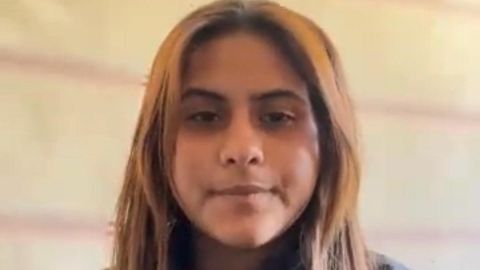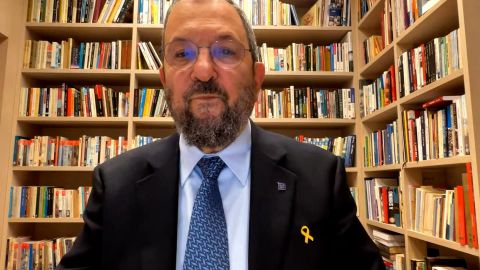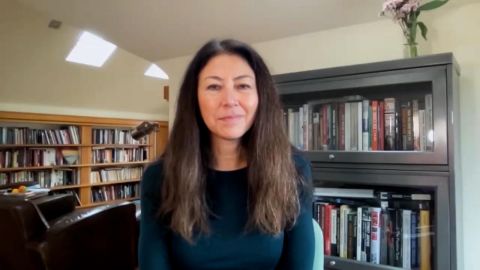Read Transcript EXPAND
CHRISTIANE AMANPOUR, CHIEF INTERNATIONAL ANCHOR: Daiana, tell me what the — what daily food and water is to you? What access do you have?
DAIANA AL-BUKHARI, DISPLACED PALESTINIAN LIVING IN RAFAH: Actually, it’s a struggle to me. I wake up every day, I just think how I how I will get the water or the food. I have to wait in line to get some food or water. While the weather, it’s not healthy. We use the same water to drink and shower and to wash the dishes and for everything. So, the water, it’s not healthy.
AMANPOUR: I’m going to play a little video from something you have recorded, because you have followers and you’re posting your daily life. So, I’m going to play this little video now.
(BEGIN VIDEO CLIP)
AL-BUKHARI: Hi, it’s Daiana from Gaza. Today, I want to show you where I live with my family since I evacuated to Rafah. Actually, I lived in this small space because we share one class with many families. So, we have only this small space. And you might ask me why we arranged these tables this way. Actually, it is my mom’s idea. She thinks that when we put our heads this way, protects us from any bombings or any airstrikes.
(END VIDEO CLIP)
AMANPOUR: Wow. So, you’re telling people that not only do you not have enough to eat and drink, but you also have to worry about the bombs and the drones overhead. Have you experienced that? What is it like when your environment is bombed?
AL-BUKHARI: It’s so scary. You know, I’m 22 years old and I live through all that. You know, it’s OK about me. What about the little children? Just think about them. Put yourself, or think how if you’re child, instead of them, under these bombs, what will you do? They are humans, they are just a child. We are human, we deserve better life. We deserve peace, Christiane.
AMANPOUR: Daiana, tell me how the children and the younger people in your family group react.
AL-BUKHARI: I think all of us have trauma now. They all have a trauma. They keep — think with their hands this way. They are afraid all the time. They’re shaking like this all time. We all have trauma now, Christiane.
AMANPOUR: Can I ask you something very basic?
AL-BUKHARI: Just to survive, Christiane. We try just to survive. Can you imagine?
AMANPOUR: Yes, you try to survive.
AL-BUKHARI: Yes.
AMANPOUR: Let me ask you something just as basic. How do you go to the bathroom? How you have, you know, places, especially women, who need feminine hygiene, who need, you know, proper sanitation, who can’t go out to back of a tent and just, you know, pee like men do? How do take care of those needs?
AL-BUKHARI: Yes. Actually, you asked me about all the struggles. You know, I just figured out that all my life is a struggle right now. I have to wait to use the bathroom. I have to wait for hours to take a shower. About the sanitary pads, it’s not always available. So, I try to find wherever I can find, to use it as a sanitary pad. And it’s not only my situation, it’s all the girls’ situation here.
AMANPOUR: And how many meals a day do you eat? As bad as it is in the north, what do you eat and how many people are you living with in your space?
AL-BUKHARI: Actually, I am lucky if I got like two meals a day. I try just to eat one meal, so we can have food for the other day. And I share the space, the classroom I live in, with many families. Like 10 families, I think.
AMANPOUR: And what’s it like when you can’t communicate, not just to people like me, but people — your neighbors, people who may still be in Gaza City who you know, people in the north?
AL-BUKHARI: There’s no answer. Most of them don’t have electricity and solar power, so they can’t contact with me. So, I have no idea about them. I have nothing to know about that.
AMANPOUR: And Daiana, are you and your family and friends and the people you’re with in Rafah, are they afraid of a ground offensive or some kind of massive offensive, Israeli offensive on Rafah?
AL-BUKHARI: Actually, they are all very scared. More innocent people will be killed. No one wants more fighting. We are praying for peace. The world must take action to prevent modern century massacre in Rafah. If that happens, it will be a modern century massacre, Christiane, in Rafah. Based on what we have seen, a ground invasion of Rafah would mean the death and suffering of thousands. There are innocent people. Imagine an army attacking the last place to live, you have left to go. Imagine you are a child with no parents in Rafah. You know, most of the child lost their of parents here. Who will keep you safe? The world leaders must protect us, Christiane. You know this war, or this genocide showed us how the people are going to tell the leaders how they feel. It showed us the truth, Christiane.
AMANPOUR: Daiana, thank you very, very much. And we will continue to pursue your stories. Thank you very much indeed. Good luck to you.
About This Episode EXPAND
Former Israeli PM Ehud Barak analyzes Israel’s handling of the war. Daiana Al-Bukhari is a displaced Palestinian now living in Rafah and joins the show. The Supreme Court has ruled to keep Trump on the CO primary ballot. Susan Glasser analyzes the implications. Reiko Hillyer traces the changes in America’s prison systems throughout the 20th century in her new book, “A Wall Is Just a Wall.”
LEARN MORE


